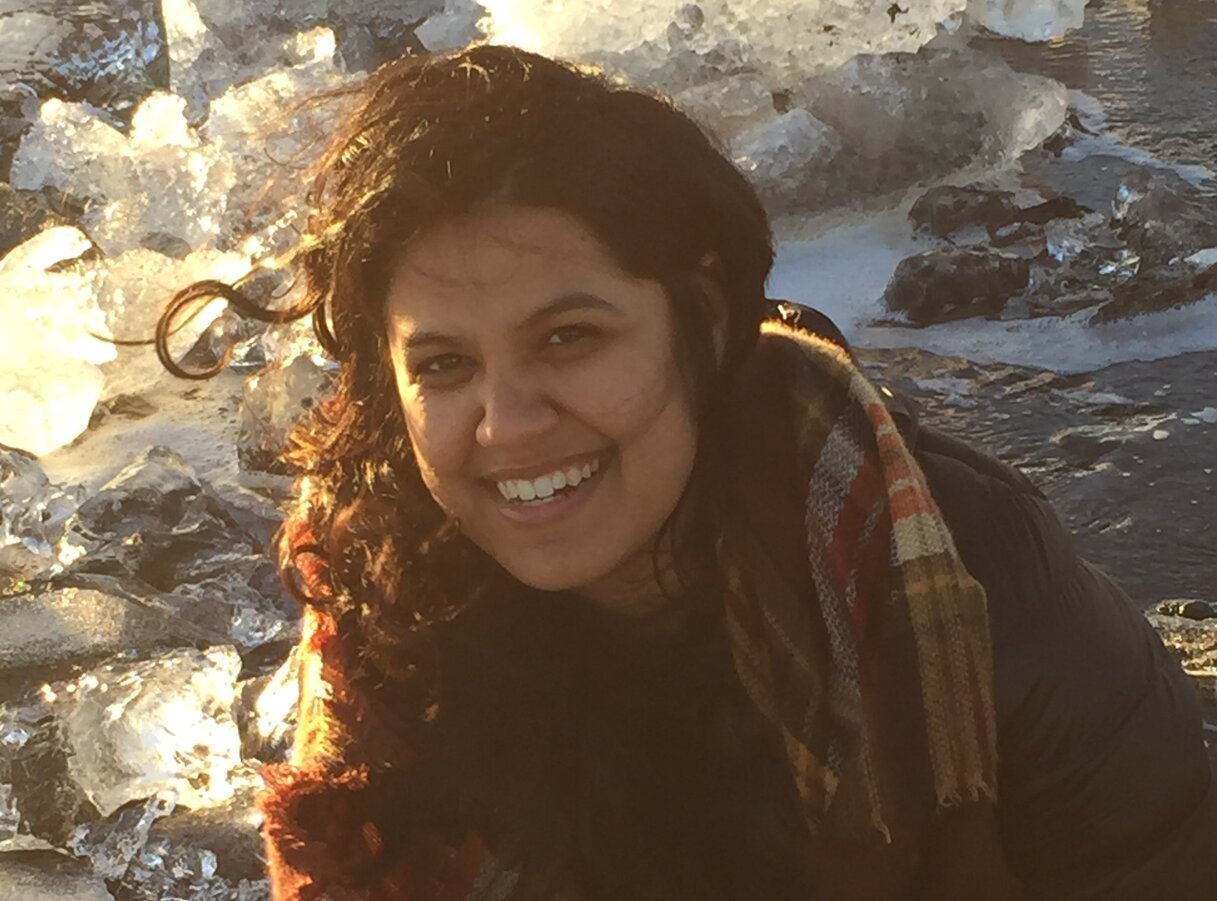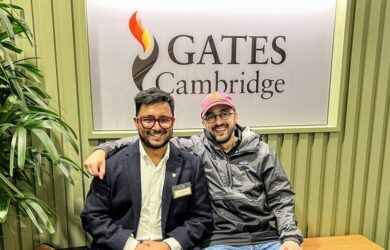
Samira Patel talks about her PhD which will compare the climate change politics of the Himalayan and Polar regions
Like the polar regions, the Himalayas has to grapple with the consequences of a melting cryosphere while managing a microcosm of considerable ecological and cultural diversity.
Samira Patel
Samira Patel [2022] is interested in how climate change-related policy works best in different community settings. Her PhD in Polar Studies, which she begins in the autumn, will investigate the links between policymaking in the Arctic and the Himalayan region, also referred to as ‘the third pole’.
It will build on her master’s, also at Cambridge, which was an ethnographic and science and technology study of the International Centre for Integrated Mountain Development [ICIMOD] based in Kathmandu. It works with eight countries in the region, including Afghanistan, China, Myanmar and Bhutan, in a similar way to the Arctic Council. “I was interested in how ICIMOD works with these neighbouring countries, in the infrastructure and science policy interfaces and forums it promotes and in the impact of its work on mountain communities,” she says.
She adds: “The Arctic serves as a geopolitical arena like the Himalayas,” she states. “Like the polar regions, the Himalayas has to grapple with the consequences of a melting cryosphere while managing a microcosm of considerable ecological and cultural diversity.”
Her PhD will take a broader look at the ‘third pole’, drawing on her background in Anthropology and her interest in migration. It is a region with such a large number of people who are vulnerable to climate change and geopolitical tensions. Her aim is to understand how climate policies can work better.
A sense of community
Samira has had an interest in migration and community work from an early age. Born in Chicago, she grew up in the suburbs in the midst of cornfields. A child of immigrants, she helped her parents to navigate life in the US. Her father never completed his education, but supported everyone else’s dreams through running a string of businesses, including a donut shop. He now co-owns a chain of small hotels.
Because her mother was working and studying to be an engineer while Samira was growing up, she often went with her father to his work. The donut shop served as a local community hub. As a small child Samira would spend her time running around the area getting to know people and developed a strong sense of the importance of community.
As she was growing up she also spent a lot of time with her mother in the library. She would often spend whole weekends there and became a voracious reader. At school she was an excellent student, graduating as salutatorian from high school.
On the side, she did a lot of community work. For instance, she won a Rotary International Scholarship for her community service work, which included working in a homeless shelter and working with children with disabilities. She also founded a chapter of Habitat for Humanity. She says: “Community has always been a really important part of my life. I grew up in a family with a spirit of generosity. I always wanted to take that forward and I was very engaged in the world around me.”
Undergraduate studies
Samira describes herself as “always ambitious and well rounded”. Having won a social studies award, she knew she was going to major in Anthropology at the University of Chicago, with a focus on immigrant and refugee rights. She had a teacher at school who had worked in East Africa and was drawn to issues around mobility and the diaspora in a region where there were many South Asians. She spent the summer of her first year in Tanzania on a foreign language acquisition grant.
Samira spent a lot of her four-year course engaged in community service, working on Chicago’s south side. “It’s easy to be in a bubble at university, but working with the community gives you a better sense of how people live, of how Chicago functions and how policies work,” says Samira. She worked at the Young Center for Immigrant Children’s Rights, which at the time was a fledgling organisation set up at the university’s Law School, but grew significantly as a result of President Trump’s immigration policies.
Samira worked mainly with East African and South Asian children detained on the Mexico border. The children were often sent to big cities like Chicago where they were looked after by non-profits. The South Asian children tended to be 16 or 17 year old boys from Punjab or Gujarat, where Samira’s family is from. They often disappeared into the community after they were released from detention because they had no grounds for fighting a legal case in the eyes of US Law. Many end up being trafficked. Samira helped to ensure they were released into families where they could be as safe as possible. She continued to work as a volunteer at the organisation from her graduation in 2012 until 2015, having done her undergraduate thesis on Punjabi immigration to the US, tracing the historical patterns of migration from the region.
From housing to space policy
Samira then won an AmeriCorps fellowship to work at the National Housing Law Project in San Francisco, following an internship at a communications agency researching technology and social policies for non-profit clients. She returned to Chicago to work at the Center for Economic Progress on tax and economic policy in relation to low-income families and urban development. Through that work she went to Washington DC where she was able to get a closer view of how policy is formulated at the federal level.
For the last five years she has worked for the US National Oceanic and Atmospheric Administration and the Center for Space Policy and Strategy. She began working on tech-related projects linked to NOAA’s science networking, building on her experience at the housing project where she had helped to create a digital library and her work on technology policy initiatives.
However, she quickly realised her interest was more in the science policy interface. Her role involved working with a whole range of stakeholders and agencies and on issues ranging from the licensing of observational satellites to national intelligence. She also worked with external stakeholders on remote sensing policy, including defence contractors, satellite companies, and think tanks through her role managing a federal advisory committee. It gave her a front seat view of whose voices are listened to when it comes to policy.
She is currently working for the Center for Space Policy and Strategy on space policy and strategy, including regulatory frameworks, having taken a year out in 2020/21 to do her masters. One of the issues she is looking at is the environmental impact of the space race from the way spaceports affect wildlife areas to space debris. “A lot of space activities are not included in our national environmental impact assessments. I am looking at how we improve that, especially as the space sector grows,” she says.
Samira is keen to return to Cambridge where she enjoyed the close links between the Scott Polar Institute and a range of other departments, from Geography to Anthropology. She is also very happy to be a Gates Cambridge Scholar, having met two at the Scott Polar Institute in the course of her master’s degree who she describes as inspirational. She says: “I am looking forward to a lot of interdisciplinary conversations. That is so important for the formulation of new ideas.”












